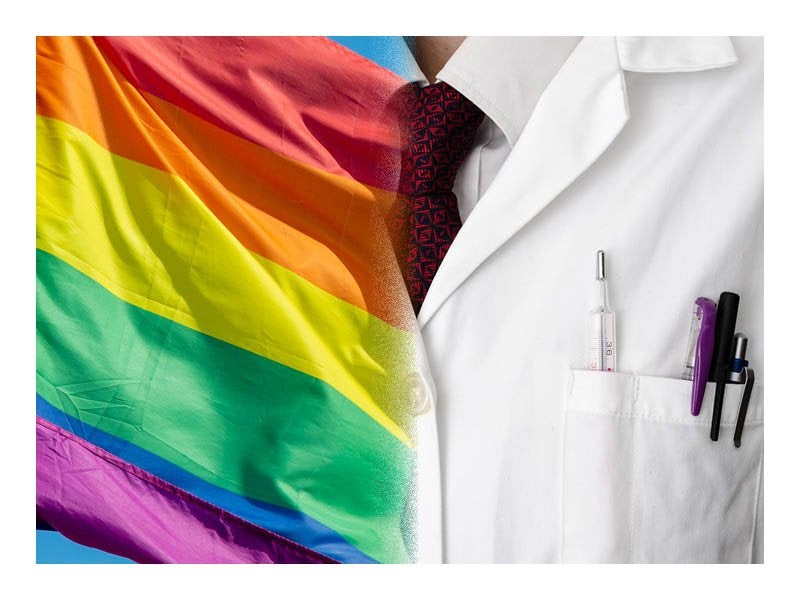Alan Braden was in his early 20s when he got his first “real” adult job in Rochester, N.Y., one that came with medical benefits as well as salary, so he decided to find a general practitioner.
Braden considered whether to be open with his physician about his sexuality, something he hadn’t been able to do while living with his parents. He decided to tell the doctor he was gay, and the physician seemed excited to have an openly gay patient, Braden said. However, the appointment didn’t work out very well.
The doctor’s first recommendation was for a syphilis panel.

“The doctor said he wanted to run the syphilis panel because 10 years ago, there had been a large amount of syphilis among the gay community in New York,” Braden said. “He wanted to make sure I wasn’t infected.”
The only problem was, 10 years previously, Braden had been 12 years old. And living in another state.
“He still insisted on the syphilis panel,” Braden said.
When medical personnel are insensitive to the health care needs of their LGBTQ+ patients, they heap on even more stress among an already stressed population, according to a statement from the American Heart Association.
MORE: The Heart of the Matter: LGBTQ+ Health Matters
Many local providers don’t seem to understand how to deal with issues of sexuality, said Gregory W. Godsey in a March 26 email. Godsey is an area clergy person and a former hospital chaplain. He is also non-binary and pansexual.
“I would say that far too often I see doctors and nurses either struggle with the concept of what being LGBTQIA+ means or that they willingly and knowingly go out of their way to address these patients improperly,” Godsey added.
Practitioners especially “seem lost when it comes to how to deal with transgender health concerns,” Godsey wrote.
Psychologist Tracy Casanova works with the LGBTQ+ Research Team at Augusta University. The team conducted a Health Needs Assessment of the LGBTQ+ community about five years ago. The project also examined the frequency of discrimination by health care providers, according to Casanova. The research included a survey of 436 LGBTQ+ individuals living in the CSRA. Questions dealt with their experiences locally with gender and sexuality-based discrimination, health care and related matters.
The research found that 27 percent of transgender Augustans surveyed have experienced harsh or abusive language from medical practitioners and 9 percent of cisgender LGB+ Augustans (those whose gender identity is the same as their physiological sex) had experienced verbal abuse from their providers. Another 28 percent of transgender Augustans had a provider use embarrassingly excessive precautions before treating them, Casanova said, while 6.2 percent of cisgender LGB+ Augustans had similar experiences. The research found that half of LGBTQ+ Augustans believe providers need more training in how to deal with LGBTQ+ people, she added.
Braden had one of those embarrassing, almost abusive experiences about a decade after the encounter with his first doctor. He had a really bad head cold and made an appointment with his physician, Braden said. He thought he might have the flu and wanted to get tested. The doctor was out the day of Braden’s appointment, so he had to see a physician’s assistant instead. He told the PA about his symptoms and that he wanted to be tested for flu. The PA, however, told him he probably had AIDS.
[adrotate banner=”19″]
“She said, ‘All you people have AIDS,’” Braden recounted.
That experience was humiliating, Braden said.
Insensitivity isn’t limited to just heterosexual medical personnel, either, Braden added. When he moved to Augusta, he needed a general practitioner, and he heard that one of the hospitals had an infectious disease clinic headed by a gay man. Braden said he made an appointment and went to see the doctor.
“He gave me a very summary physical. He was very detatched from the encounter,” Braden said. “He thought I wanted to date him.”
The physician was worried that it would get out he was gay, and he wouldn’t get promotions and raises and that his career choices would be limited, Braden said. Braden never went back to that doctor, he added.
For those in the trans community, health care workers need to be even more sensitive, Augusta University psychologist and postdoctoral fellow Matt Kridel said. Something as simple as what pronouns a medical person uses to refer to the patient may be a source of alienation for a trans person. Medical providers have to be especially sensitive when treating transgender people because they are dealing with people who may have an anatomy different from what they were born with or who use a name different from their legal name.
Health care workers have to find the right way to bring up issues related to anatomy when they are treating transgender people. For, they may have to ask someone who has transitioned from female to male about annual pap smears if they still possess a uterus, said Kridel.
[adrotate banner=”23″]
“It’s one thing to know trans men need pap smears. It’s another to have the right attitude,” he added.
Even so, the way that question is asked can be an issue.
“The way you ask or don’t ask because you’re terrified still leads to a gap,” Kridel said. “Communication can be a key. Some people get paralyzed because they don’t know the right pronouns to use or don’t know how to bring it up.”
He suggests providers start by creating a safe environment in which they can ask a transgender person is in the transition process or whether homosexual patients have had appropriate conversations with their partners about whether they’ve been tested for HIV.
Even a single lecture on LGBTQ+ health needs can better prepare a medical or allied health student for treating patients from that community, according to the American Heart Association.
Physicians and other health care providers need – and want — better training if they want to reduce health-care-related stress among their LGPTQ patients, Casanova said, a sentiment echoed by other providers.
Research has shown that medical students know they need better training, he said. Some work on educating themselves through research and reading, he said, and he anticipates systematic education is on the horizon.
[adrotate banner=”29″]
“I think it’s moving in that direction,” Kridel said. “AU has the Equality Clinic, where you have a free clinic for the LGBTQ+ community. I see students going so far as to create opportunities for themselves.”
Casanova says research, and experience, suggest that health care providers can prepare for treating a diverse patient population by being open and taking stock of their assumptions about sexual minorities. Being willing to apologize for mistakes in language or assumptions can also help a provider build a solid relationship with a patient, she said.
“A lot of trans individuals will be misgendered and the name on the chart may be referred to in the wrong way,” she said. “Just apologize and try to do better.”
Learning to ask questions without making assumptions about gender is another important step for providers who want to make their LGBTQ+ patients more comfortable, Casanova said.
Kridel says being well informed about health care issues for specific communities is key for providers.
“There are still medical professionals who are woefully undereducated on how to properly care for LGBTQ+ patients and some even outwardly continue to espouse falsehoods – such as LGBTQ+ identity being a mental illness, which has been rejected by every major medical organization,” he said.
Kridel specifically deals with how to talk about sexual health issues in his small group learning courses for medical students. He also works on the topic with the MCG residents he supervises.
[adrotate banner=”19″]
Augusta University helps prepare future providers for treating LGBTQ+ patients through its support the Equity Clinic. The Equity Clinic treats uninsured and under-insured member of the LGBTQ+ community and was established about a decade ago as the brainchild of an AU medical student.
The clinic is still medical-student driven, according to Chris Dresher, an AU psychologist and a member of the clinic board. Physician-directed medical students and students from other disciplines volunteer every-other Wednesday to provide primary care services to uninsured and under insured members of the LGBTQ+ community.
One of the main services the clinic provides is hormone replacement therapy for transgender people. These treatments are what help people make the transition from male to female or female to male.
Those treatments can have heart implications because of the use of estrogen, and so they have to managed by a physician.
Dresher said the clinic doesn’t see a lot of people with cardiovascular issues, but they do see a lot of patients who suffer from stress. Clinic volunteers aren’t likely to treat patients for stress, but they do provide referrals to other providers.
One of the ways clinics such as the Equality Clinic can make medical treatment less traumatic is to be aware of the patient’s entire experience while in the clinic. That should start with examining the reception experience and include assessing the clinic’s forms for whether they force a gender choice by providing check boxes or allow the individual to write in their gender.
[adrotate banner=”22″]
Dresher said it’s not uncommon for patients to drive from North Carolina, south Georgia or even farther away to visit the Equality Clinic.
“We thought the clinic would serve the broader LGBTQ+ community,” Dresher said. “We had no idea we’d tap into this unmet need.”
In 2016, the British medical journal The Lancet evaluated the U.S. Department of Health and Human Services annual report, “Advancing LGBT Health and Well-being.” The Lancet declared the report to be “both welcome and necessary.”
“Neglecting the health of LGBTQ people can lead to life-long health disparities, which increases pressure on health-care systems, as a result, for example, of costs of HIV care of treatment for medical health issues,” The Lancet editors wrote.
MORE:
The U.S. in 2015 had led the way in extending LGBTQ civil rights by committing to address health needs of the LGBTQ community, they added.
In 2020 a report from the National LGBT Health and Education Center found that social acceptance of those it serves has continued to improve, but health care disparities still exist.
Debbie Reddin van Tuyll is Editor-in-chief of The Augusta Press. Reach her at debbie@theaugustapress.com.
[adrotate banner=”45″]













